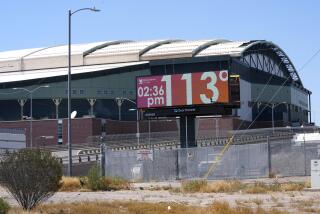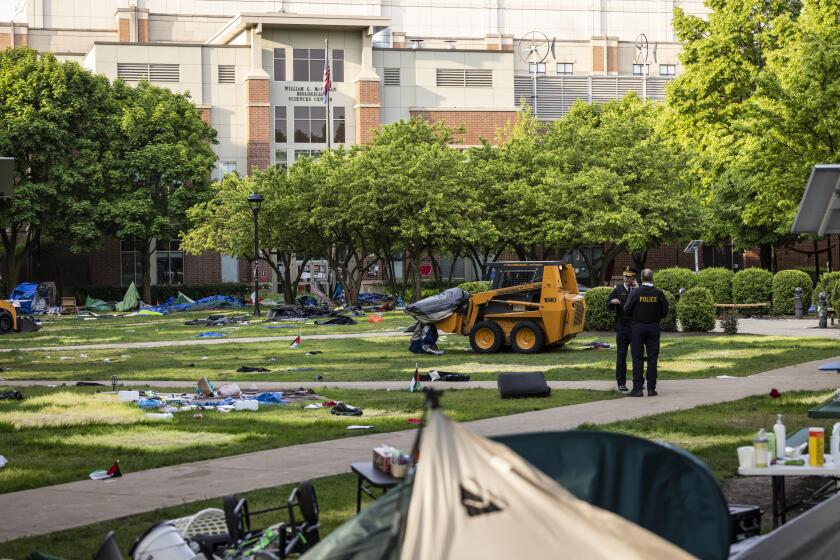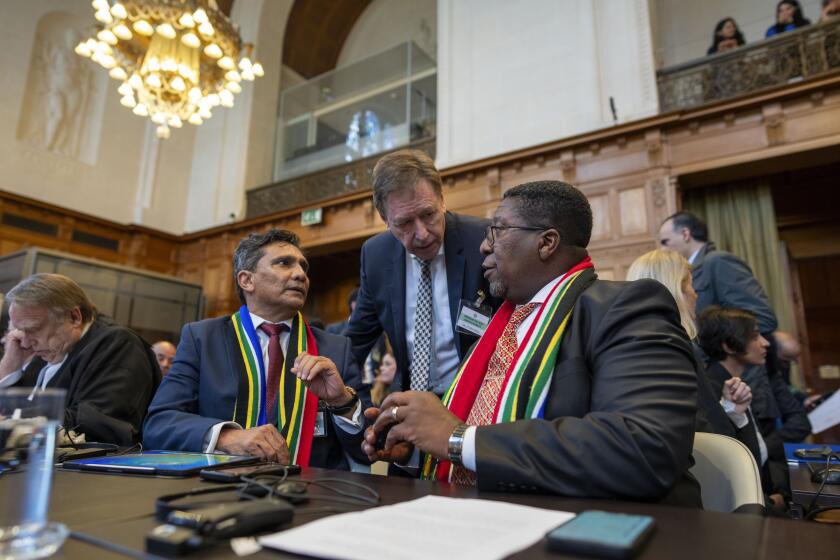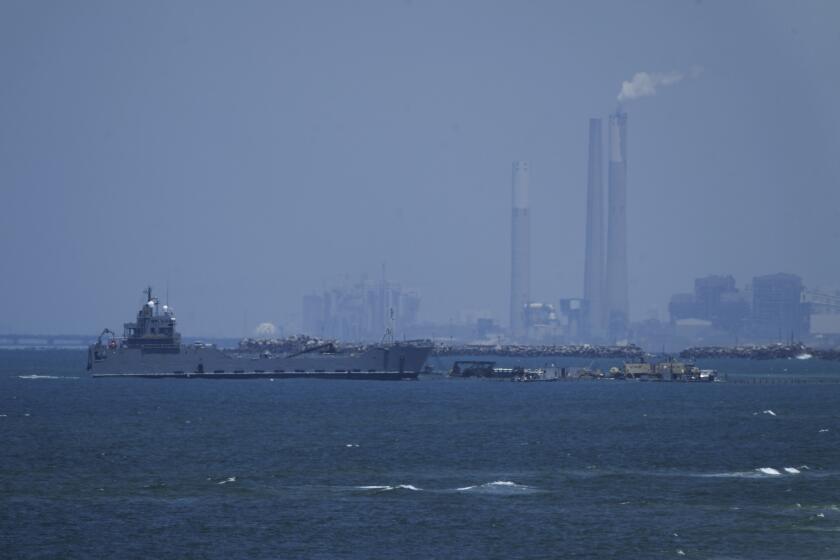A High Interest in Low-Profile Official
He’s the man who launched a thousand puns, virtually all of them the same, by writers who play on his surname by asking: “Hu’s on first?”
The man they’re referring to is Hu Jintao, China’s vice president, and by all accounts, he is indeed on first, waiting in the wings to succeed President Jiang Zemin as the man leading this nation of 1.3 billion people.
By spring next year, Hu is expected to be installed as both China’s president and the secretary-general of the ruling Communist Party, the culmination of a quiet but meteoric ascent through the ranks from lowly apparatchik to the country’s No. 1.
Today, President Bush became the first U.S. official to meet Jiang’s heir apparent. Now No. 5 in China’s political hierarchy, Hu introduced Bush this morning to an audience of students at his alma mater, Qinghua University in Beijing, where the U.S. president delivered a nationally televised speech.
The encounter between the two men was brief but nonetheless welcome for U.S. officials, who have been eager for face time with Hu since his status as presumptive heir began to crystallize in recent years.
At 59 the youngest member of China’s inner circle, Hu could be at the helm of the world’s most populous country well into the next decade.
Despite his rising star, however, Hu has managed to remain an international man of mystery, something of a cipher even to his compatriots.
Beyond some well-rehearsed details of his political career--and the fact that he is supposed to be a polished dancer and have a near-photographic memory--few people know much about him or what he thinks about some of the most pressing issues facing China, from economic policy to religious freedom to the Internet.
Analysts are left to glean clues from his tenure as the top man in Tibet a decade ago, his leadership of poverty-stricken Guizhou province and his present stewardship of the Central Party School in Beijing, where cadres receive ideological and practical training.
To some extent, experts say, Hu’s low profile is deliberate, part and parcel of Chinese political protocol, in which upstaging a more senior leader can be a serious offense.
“It would be unwise for Hu Jintao to be in the spotlight too much or to express his opinions too openly while his boss, Jiang Zemin, is still in charge,” said Cheng Li, a professor at Hamilton College in New York, who has written a book about the coming shift in power in China. “Now it is still the Jiang administration; it should be Jiang’s show. It will be Hu’s show when he officially takes over.”
As vice president since 1998, Hu’s most visible moment came in May 1999, during one of the most tense periods in U.S.-China relations in recent years.
Violent street protests had erupted after U.S.-led North Atlantic Treaty Organization forces accidentally bombed the Chinese Embassy in Belgrade, Yugoslavia. The U.S. Embassy in Beijing was under siege. Hu became the public face of the government, the Politburo member who went before the cameras to say that the desire to protest was understandable but that such activities should be conducted “in accordance with the law.”
The statement underlined what some see as the main thread running through Hu’s career: loyalty to the Communist Party and its iron grip on China.
It didn’t herald what others thought might be a lasting grudge toward the West in general and the United States in particular. Last month, in a meeting with a handful of U.S. academics and retired diplomats, Hu stressed the need for better relations between Washington and Beijing.
His expected elevation to the top job next year will come while Bush is only halfway through his own term, ensuring that they will have to deal with each other for at least two years.
The two men are fairly close in age but worlds apart in their life experiences.
As a young man, not long graduated from Qinghua with a degree in engineering, Hu was shipped off to Gansu, a landlocked, dirt-poor province deep in the Chinese interior where he spent more than a decade as a construction official during the upheaval of the 1966-76 Cultural Revolution.
He managed to attach himself to an influential patron and rose through the 1980s to top positions in the provincial and then national Communist Youth League, which remains his biggest power base.
In 1985, he became the country’s youngest provincial party secretary, assigned to Guizhou province in the south. And from 1988 to 1992, he was the party boss of Tibet, where he made his name by imposing martial law in 1989 to quell pro-independence protests. The crackdown succeeded, and in 1992, Hu joined the party’s Central Committee, or Politburo.
His resume shows experience in a wide range of areas, from party affairs to ethnic minority issues in Tibet. But glaringly lacking, analysts say, is experience managing China’s growing economy, of paramount importance now that the country has entered the World Trade Organization.
But a Western visitor who has met Hu said the Chinese vice president projected an air of confidence and capability and was at ease discussing a variety of issues without referring to notes.
“One has a sense he’s been preparing himself for his future responsibilities [and] preparing himself well,” said the visitor, who asked not to be identified. “One senses that he has the ability and self-confidence to continue the reforms.”
It is unclear, however, whether those reforms might encompass changes to China’s single-party political system.
Although the party school, under Hu’s leadership, has studied European models of social democracy and the democratic transitions of former Communist countries, no one has suggested that this indicates Hu’s own train of thought.
More to Read
Start your day right
Sign up for Essential California for news, features and recommendations from the L.A. Times and beyond in your inbox six days a week.
You may occasionally receive promotional content from the Los Angeles Times.







